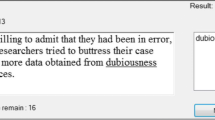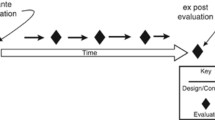Abstract
In this paper I explore potential benefits with using the concept qualifying function as a tool for systems design. The concept originates from the philosophy of Herman Dooyeweerd and refers to the function or character that guides and directs the internal structure of an entity or activity. This means that if the qualifying function for an entity or activity changes, its structure as a whole will change as well. Due to this, the concept and its related theory can help people to view situations from new and different perspectives and to explore the consequences of different views. It can provide a common base for the design around which accommodation more easily can be reached and from where further discussions can be continued. Finally, it has the potential to point at fundamental differences of opinion between participants and stakeholders.
Similar content being viewed by others
REFERENCES
Ackoff, R. L. (1993). Idealized design: Creative corporate visioning. Int. J. Manage. Sci. 21, 401-410.
Bergvall-Kåreborn, B., and Grahn, A. (1996a). Expanding the framework for monitor and control in soft systems methodology. Syst. Pract. 9, 469-495.
Bergvall-Kåreborn, B., and Grahn, A. (1996b). Multi-modal thinking in soft systems methodology's rich pictures. World Futures 47, 79-92.
Bratt, J. D. (1998). Abraham Kuyper-A Centennial Reader, Paternoster Press, Carlisle.
Checkland, P. B. (1981). Systems Thinking, Systems Practice, John Wiley & Sons, New York.
de Raadt, J. D. R. (1991). Information and Managerial Wisdom, Paradigm, Idaho.
de Raadt, J. D. R. (1995). Expanding the horizon of information systems design. Syst. Res. 12, 185-199.
de Raadt, J. D. R. (1997). A New Management of Life, Edwin Mellen Press, Lewiston.
Dooyeweerd, H. (1973). Introduction. Philosophia Reformata 38, 5-16.
Dooyeweerd, H. (1997). A New Critique of Theoretical Thought, Edwin Mellen Press, Lewiston.
Eriksson, D. M. (1998). Managing problems of postmodernity: Some heuristics for evaluation of systems approaches. IR-98-060 /August, IIASA, Laxenburg.
Flood, R. L., and Jackson, M. C. (1991). Creative Problem Solving-Total Systems Intervention, John Wiley & Sons, Chichester.
Glas, G. (1995). Ego, self, and the body. An assessment of Dooyeweerd's philosophical anthropology.
In Griffioen, S., and Balk, B. M. (eds), Christian Philosophy at the Close of the Twentieth Century. Assessment and Perspective, Uitgeverij Kok, Kampen.
Henderson, R. D. (1994). Illuminating Law-The Construction of Herman Dooyeweerd's philosophy, Doctoral thesis, Free University, Amsterdam.
Kalsbeek, L. (1975). Contours of a Christian Philosophy-An Introduction to Herman Dooyeweerd's Thought, Wedge Foundation, Toronto.
Le Moigne, J. L. (1989). Systems profile: First, joining. Syst. Res. 6, 331-343.
Midgley, G. (1997). Mixing methods: Developing systemic intervention. In Mingers, J., and Gill, A. (eds.), Multimethodology: The Theory and Practice of Combining Management Science Methodologies, John Wiley & Sons, Chichester, pp. 249-290.
Mirijamdotter, A. (1998). A Multi-Modal Systems Extension to Soft Systems Methodology, Doctoral thesis, Luleå University of Technology, Luleå.
Morgan, G. (1986). Images of Organization, Sage, London.
Vickers, G. (1959). The Undirected Society, University of Toronto Press, Toronto.
Author information
Authors and Affiliations
Rights and permissions
About this article
Cite this article
Bergvall-Kåreborn, B. The Role of the Qualifying Function Concept in Systems Design. Systemic Practice and Action Research 14, 79–93 (2001). https://doi.org/10.1023/A:1009587727730
Issue Date:
DOI: https://doi.org/10.1023/A:1009587727730




